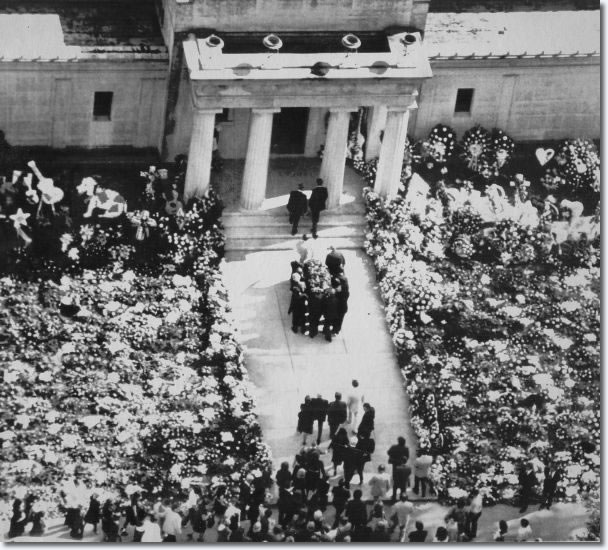
Elvis Presley died at Graceland on August 16, 1977. He was 42 years old.
Through the early morning of the 16th Elvis took care of last minute tour details and relaxed with family and staff. He was to fly to Portland, Maine that night and do a show there on the 17th, then continue the scheduled tour.
Elvis retired to his master suite at Graceland around 7:00 AM to rest for his evening flight. By late morning, Elvis Presley had died of heart failure.
In a matter of hours the shock registered around the world.
Paramedics were called, but they failed to revive Elvis, and he was taken to Baptist Memorial Hospital where further attempts to resuscitate him failed. He was pronounced dead by his physician, Dr. George Nichopolous, who listed the official cause of death as erratic heartbeat, or cardiac arrhythmia.
As the news of Elvis' death spread across the country, radio stations immediately began to play his records. Some stations quickly organized tributes to Elvis while others simply played his music at the request of listeners, many of whom were in a state of shock over his sudden death.
Some people called their favorite radio stations just because they wanted to tell someone their stories about the first time they'd heard Elvis sing or to talk about how much his talent and his music meant to them.
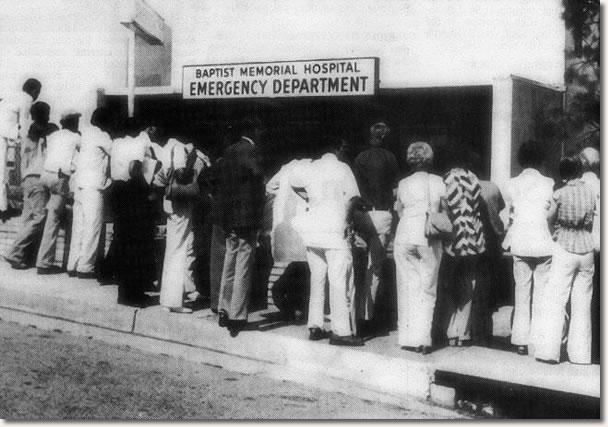

In the same way that many people remember exactly where they were when they heard President John F. Kennedy had been killed, most of Elvis' fans remember where they were the day Elvis died. Mick Fleetwood, of rock group Fleetwood Mac, recalls, 'The news came over like a ton of bricks. I was driving back from the mountains, and I had the radio on. They were playing an Elvis medley, and I thought, 'Great' --- And then they came back with the news'.
The staff of television newsrooms considered Elvis' death a late-breaking story. There was not enough time for TV reporters who had been sent to Memphis to file stories for the evening news. Executives had to decide quickly what film footage they could use from their files and where to place the story in relation to the other news of the day. NBC-TV not only rewrote their news lineup to lead off with the story of Elvis' death, but the network also made immediate plans to delay The Tonight Show and put together a late-night news documentary. David Brinkley, a national news anchor for NBC at the time, opened his broadcast with three minutes devoted to Elvis' sudden death. ABC-TV also decided to lead with the Presley story.
When they learned that NBC would be doing a late-night news special about the significance of Elvis Presley to American music, ABC announced that they would also air a half-hour documentary.
CBS did not follow suit, however. The CBS Evening News with Walter Cronkite, featuring the most respected man in broadcasting at that time, had led the news program ratings for more than a decade. CBS executives chose not to open the evening broadcast with the Presley story. Arbitron's records indicate that when millions of viewers realized this they immediately switched the channel to another network.
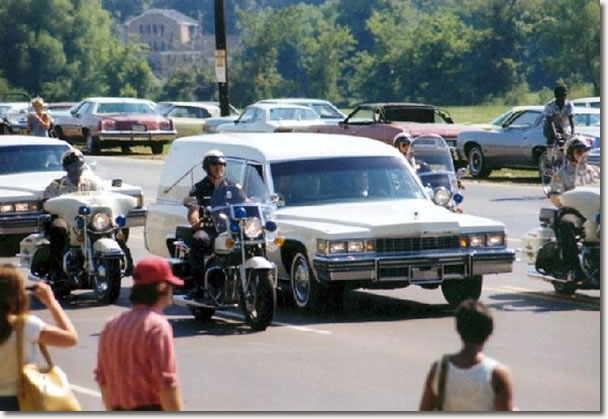
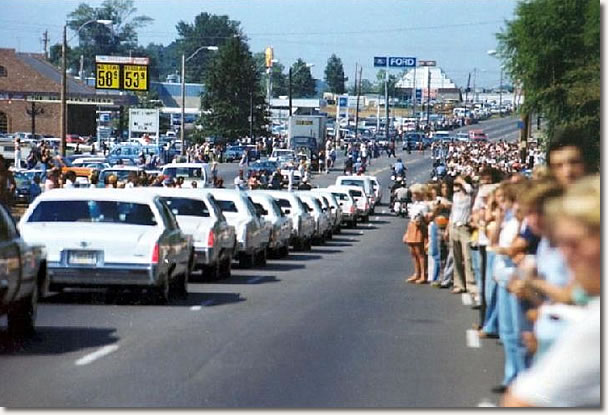
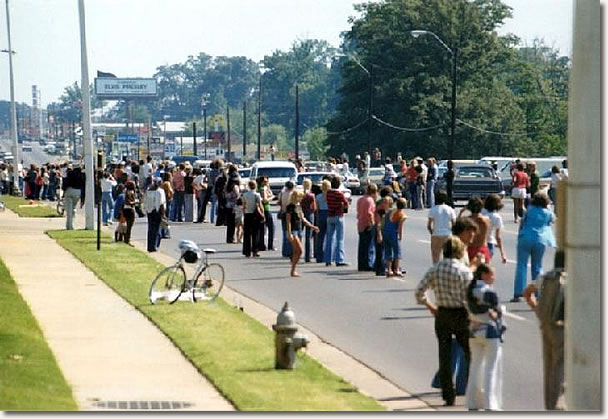
The CBS decision not to lead with Elvis' death gave the CBS Evening News its lowest ratings in years. (For the record, Roger Mudd was substituting for Walter Cronkite that evening.) CBS devoted only 70 seconds to its story on Elvis, placing it after a lengthy segment on the Panama Canal. The producer for that evening's news was vehemently opposed to leading off with Elvis' death, in spite of other members of the CBS programming staff suggesting it repeatedly. Interviewed later, the producer agreed that he was out of sync with the national consciousness. Two days later, CBS tried to save face by putting together a documentary on Elvis.
Even though Elvis never performed in Europe, countries from all over the world sent reporters to Memphis. The press coverage in foreign newspapers and on European television was almost as extensive as the reporting in the United States. Everywhere in the world, people lamented the loss of an irreplaceable entertainer.
Within one hour after Elvis' death, fans began to gather in front of Graceland.
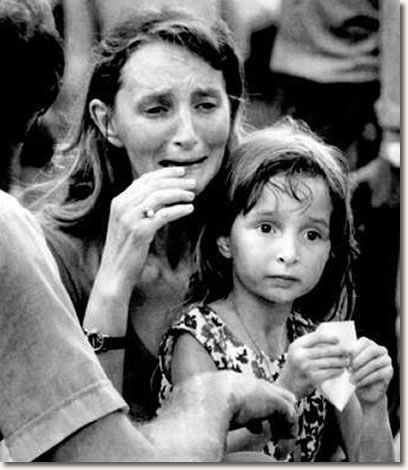
Numerous celebrities attended Elvis' funeral, including Caroline Kennedy, country music guitarist Chet Atkins, performers Ann-Margret and George Hamilton, and television evangelist Rex Humbard, who was one of the speakers during the service. Comedian Jackie Kahane, who had opened many of Elvis' concert performances, delivered his eulogy, and a local minister also spoke. Gospel performers sang, including Jake Hess, J.D. Sumner, James Blackwood, and their vocal groups, as well as singer Kathy Westmoreland. The casket was carried to Forest Hill Cemetery in a long motor cortege of all-white automobiles.
Later, when someone threatened to steal Elvis' remains, his casket was moved to the Meditation Garden behind Graceland. Gladys's body was also moved to the Meditation Garden in 1977; Vernon Presley died and was buried there in 1979; and Minnie Mae Presley was laid to rest beside the rest of her family in 1980.
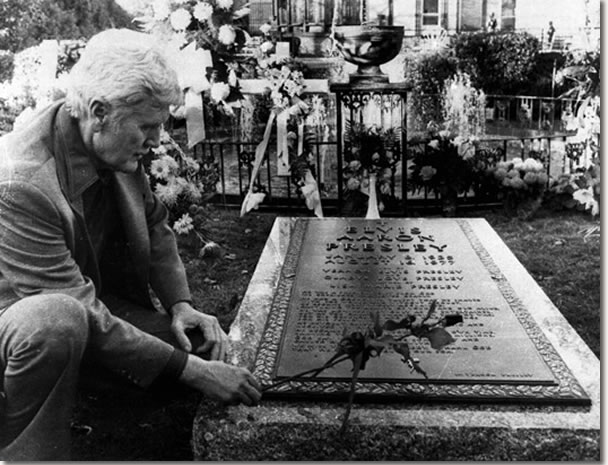
Vernon Presley, Elvis Presley's father, places a rose on his son's grave Nov. 24, 1977, as newspeople were permitted inside the grounds at Graceland in Memphis, Tenn., for the first time since Elvis' funeral.

No comments:
Post a Comment